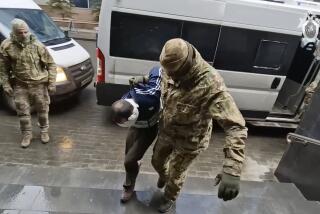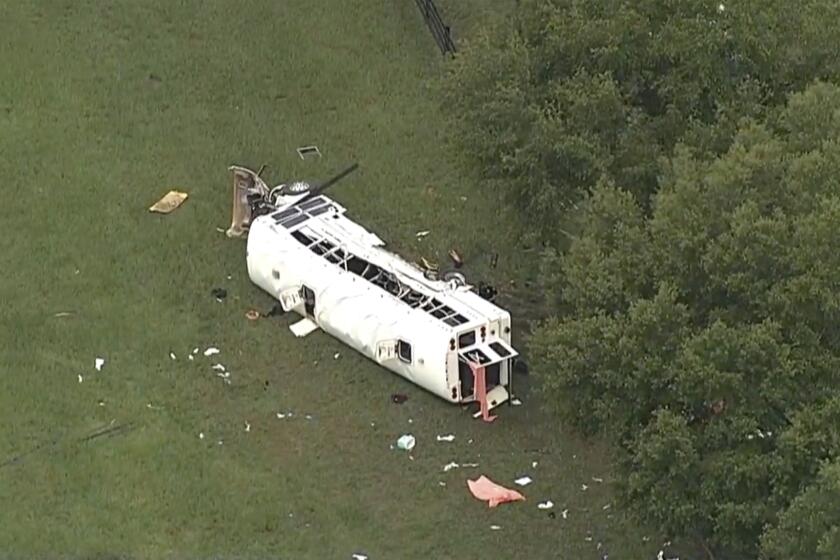U.S. Aid Worker Abducted in Chechnya
Kenneth Gluck’s day began just like many others for the U.S. aid worker tending to the needs of the people of the breakaway Russian republic of Chechnya.
He made sure his papers and security passes were in order, climbed into his well-marked Doctors Without Borders car and drove into Chechnya from this town in a neighboring republic.
But the day turned into a nightmare shortly after his convoy pulled away from a rural Chechen hospital Tuesday afternoon, according to a physician who was traveling with Gluck.
In a methodical ambush, masked gunmen stopped Gluck’s four-car convoy, reached into his car and dragged the 38-year-old away, firing a barrage of shots as they drove off, the physician said Wednesday. Gluck, the first American to disappear in Chechnya in almost six years, hasn’t been heard from since.
“We didn’t expect it to happen in broad daylight--a market, a hospital nearby, lots of people around in the street,” said the doctor from the Dutch branch of Doctors Without Borders, which asked that he not be identified. “It was like in a story. I had no time to understand anything. . . . I heard bullets hit the car.”
Russian officials quickly blamed Chechen rebels for the attack in Stariye Atagi, about 10 miles south of the Chechen capital, Grozny. The aid group said it has no indication who seized Gluck--the gunmen didn’t identify themselves, and no ransom request has been received.
On Wednesday, the group--fearing for Gluck’s safety--actively discouraged any speculation about who might have been responsible. “We do not want to point fingers,” said Jim Lewis, the group’s Moscow-based logistics coordinator. “All we want is to get Kenny back.”
Many foreigners, including aid workers, have been kidnapped in Chechnya, especially in the period between Russia’s two wars against the separatist region. Since the second war began in August 1999, however, the number of kidnappings has fallen off considerably.
The area where Gluck was seized has long been under Russian control, although small groups of rebels are able to move through most areas of Chechnya by evading Russian checkpoints.
“Despite the fact that it is still unclear what exactly happened to Gluck, one thing is obvious--the kidnapping of the American is an extraordinary incident which could not have been carried out by a stray gang of Chechen rebels,” said Vyacheslav Izmailov, a former military officer and an expert on Chechen kidnappings. “In any case, regardless of who did it, it was a very carefully planned crime.”
Gluck, who directed Doctors Without Borders’ relief programs in Chechnya, is the first prominent American aid worker to disappear in the rebel region since Frederick C. Cuny, a disaster specialist working for the Soros Foundation, vanished in March 1995. Cuny is believed to have been killed shortly thereafter, but his body has not been recovered.
Colleagues here in Nazran, in the republic of Ingushetia, describe Gluck as the epitome of a committed relief worker--hard-working, passionate, caring and a patient listener, who over time has become a valued friend to hospital directors across Chechnya.
Dr. Therese Zink, of Cincinnati, who recently arrived in Ingushetia to work for the group, said Gluck was at the job from 6 a.m. to 11 p.m. each day. He would eat his dinner with the aid group’s drivers and tirelessly translate their stories each night for staffers less adept in Russian. Another colleague recalled a discussion about providing psychological help to the Chechen population, and someone quipping: “I don’t know what they need--but they definitely need Kenny.”
Gluck is employed by the Dutch branch of Doctors Without Borders, which in a statement said it was “outraged at this direct attack on a clearly marked humanitarian convoy that was delivering medical assistance to the Chechen population.” The group won the Nobel Peace Prize in 1999.
Gluck’s work for Doctors Without Borders consisted nearly exclusively of providing medicine and other supplies to about two dozen Chechen medical clinics, and overseeing small hospital reconstruction projects. In November, Gluck testified to the Council of Europe about the doctors’ experiences, detailing “massive acts of aggression” by Russian forces against Chechen civilians, who are “subjected to a policy of terror.”
The Russian military suggested that Gluck had been seized by Chechen rebels for ransom and accused him of traveling in the war zone without permission.
“Such behavior in Chechnya by citizens of foreign governments and employees of humanitarian missions is dangerous, which, unfortunately, was shown by the case with Kenny,” said Lt. Gen. Ivan Babichev, Russia’s military administrator in Chechnya. “Part of the blame for this tragedy lies with the international organization.”
Gluck’s colleagues said he was carrying all necessary papers, including a two-week travel pass signed by Babichev himself. To obtain the pass, the group supplied the military with its itinerary for the two-week period, including the visit to Stariye Atagi.
Gluck, a Queens, N.Y., native, is an experienced aid worker who had served in Bosnia-Herzegovina, Tajikistan and Colombia.
International relief groups suspended their missions in Chechnya after six workers with the International Committee of the Red Cross were killed by masked gunmen in December 1996, and only a few, including Doctors Without Borders, have since resumed--but they remain based outside the republic.
Russia’s first war against Chechnya ended in a stalemate in 1996. For the next three years, the republic enjoyed de facto independence, and many Chechen field commanders turned their efforts to kidnapping for ransom. Hundreds, if not thousands, of Russians have spent time in captivity, as have several dozen foreigners.
But some observers suggested that Gluck’s disappearance is more like that of Andrei Babitsky, a journalist for U.S.-funded Radio Liberty who was detained in January 2000 by Russian forces and accused of being a traitor for reporting on the Chechen side of the war. Russian officials later turned him over to alleged Chechen rebels who eventually freed him; Babitsky has maintained that his abduction was organized by Russian security services in retaliation for his critical news reporting.
“The Babitsky case has clearly demonstrated that the involvement of Russian secret services in kidnappings of people in Chechnya can by no means be ruled out,” Izmailov said. “The logic of the secret services would be easy to understand--Gluck’s kidnapping would cool some hotheads in Russia and abroad who insist on immediate negotiations with the rebels and the termination of hostilities. The kidnapping would be a perfect way to show the world how monstrous and unruly Chechen rebels can be.”
*
Daniszewski reported from Nazran and Reynolds from Moscow. Alexei V. Kuznetsov of The Times’ Moscow Bureau contributed to this report.
More to Read
Start your day right
Sign up for Essential California for news, features and recommendations from the L.A. Times and beyond in your inbox six days a week.
You may occasionally receive promotional content from the Los Angeles Times.





